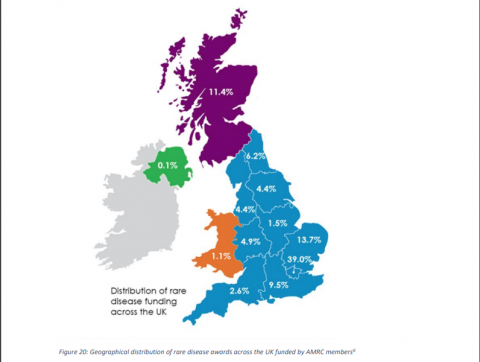Charities and government invested more than £1.1bn in rare disease research between 2016 and 2021, a major new report has shown.
Rare disease funding accounted for 7% of the total value of awards granted through the joint Medical Research Council (MRC) and National Institute for Health and Care Research (NIHR) portfolio.
This represents nearly £627m of investment from both organisations via 698 awards in the five-year period.
Over half a million participants were recruited to NIHR-supported rare disease research studies between 2016 and 2021.
Approximately £580m was funnelled into more than 2,600 studies from charities who are members of the Association of Medical Research Charities (AMRC).
The MRC-NIHR report, which was developed in collaboration with the devolved administrations as well as the private and third sector, also highlighted the role of industry in rare disease research.
Over 250 projects were supported by the independent sector with cystic fibrosis being the most commonly researched (11%) heath condition. Just under half (49.3%) of all NIHR-supported rare disease work was funded commercially.

NIHR chief executive, Professor Lucy Chappell, said: “This report is the first time anyone has captured a detailed picture of the rare disease research being funded across the UK. Our findings are another step in understanding the strength and diversity in rare disease research.”
Some of the more notable rare disease research examples include NIHR Manchester researchers who were central to the development of the ground-breaking cystic fibrosis treatment, Kaftrio.
Kaftrio is a triple combination therapy that was found to be effective in 90% of cystic fibrosis patients with an average lung function improvement of more than 20%.
It also includes NIHR Sheffield researchers who spearheaded a landmark clinical trial that proved the drug tofersen can slow and reduce the progression of motor neurone disease if it was caused by the faulty SOD1 gene.
Incoming executive chair at MRC, Professor Patrick Chinnery, added: “It is vital that we have a shared understanding of where we are now, so together we can improve coordination and support for rare disease research that can lead to better patient outcomes.
“Colleagues from across research funding sectors, including government, charities and industry, have come together to produce a unique snapshot of current investment, and developed data mapping processes that can be applied across a range of funding types.”
He continued: “We hope the data rich resource underpinning this review will help foster collaboration and lead to novel avenues for discovery.”
To read the full report, click here.
Image credit: iStock



















